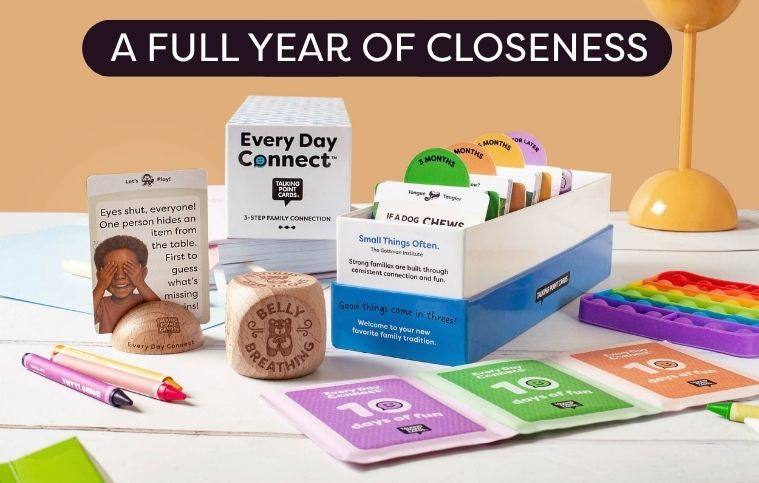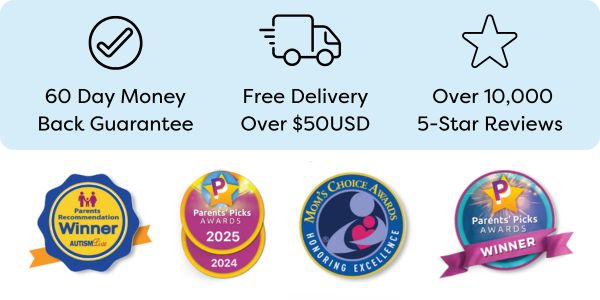SHOP
About
Why "How Was Your Day?" Falls Flat Every Time
The Magic of Questions That Actually Work
10 Questions That Actually Get Kids Talking
Making These Questions Work in Real Life
When One Question Leads to Everything
The Tool That Makes It Even Easier
The Bottom Line
Shop Family Products
You know that moment when you pick up your kid from school, all excited to hear about their day, and you ask that classic parent question: "How was your day?"
"Fine."
So you try again. "What did you do today?"
"Nothing."
Ugh. There you are, sitting in your car feeling like you're speaking to a brick wall. Or maybe it's dinnertime and you're desperately trying to get some conversation going, but everyone's just... existing in the same space without really connecting.
I get it. I've been there too. That's the thing about parenting – sometimes you feel like you're living with these little humans you love SO much, but you can't figure out how to crack their shell. Especially when they hit those middle school years and suddenly become experts at one-word answers.
But here's what I've learned: the problem isn't that our kids don't want to talk. It's that we're asking the wrong questions.
Why "How Was Your Day?" Falls Flat Every Time
Let's be real for a second. When someone asks you "How was your day?" what's your instinctive response? Probably "fine" or "good," right? Even when your day was actually pretty interesting, that question just feels so... generic. So expected.
Your kids feel the same way. They're not trying to shut you out (well, most of the time). They just don't know how to answer such a big, vague question. I mean, where do they even start?
Plus, by the time they're 8 or 9, they've heard that question approximately 2,847 times. It's become background noise. Their brain automatically goes to default mode: Fine. Nothing. Can I have a snack now?
The solution? We need to get specific. We need to ask questions that actually make them think, that tap into their curiosity, that show we care about their inner world – not just their daily schedule.
The Magic of Questions That Actually Work
Here's the thing about great conversation starters: they bypass the small talk and go straight to the good stuff. They're unexpected enough that your kid can't answer on autopilot, but not so intense that they feel like they're being interrogated.
Research shows that meaningful family conversations can improve brain development and language processing skills in children, increase happiness and reduce stress, and strengthen relationships. But the key word here is meaningful.
So I've put together 10 questions that consistently get kids talking – and I mean really talking, not just answering. These aren't your typical dinner table questions. They're designed to spark curiosity, tap into emotions, and maybe even surprise you with what your kid is thinking about.
10 Questions That Actually Get Kids Talking
-
What is one thing you'd like to learn in the next year?
This question is beautiful because it gets them thinking about the future without the pressure of "what do you want to be when you grow up?" (which, let's be honest, stresses them out). Maybe they want to learn skateboarding, or how to bake bread, or why thunder happens. Whatever it is, you're getting a peek into their curiosities.
-
Does your family ever embarrass you? How?
Okay, this one might sting a little, but it's SO worth it. Kids feel seen when you acknowledge that yeah, sometimes parents are embarrassing (shocking, I know). It opens up honest conversation and often leads to some pretty funny stories. Plus, you might learn that your tendency to sing along to the radio isn't as charming as you thought.
-
What's one special talent that you would like to have?
This goes deeper than "what's your favorite subject?" It taps into their dreams and aspirations in a low-pressure way. You might discover your kid secretly wishes they could speak to animals, or fly, or make people laugh when they're sad.
-
If someone you loved was very sick but could not afford the medicine to get better, would it be OK to steal the medicine?
Now we're getting into the good stuff. This is the kind of question that reveals how your child thinks about right and wrong, fairness, and complex moral situations. There's no "right" answer, which is exactly why it works so well. It gets them thinking critically.
-
If you got into really big trouble, how do you think your parents would respond?
This one is incredibly revealing. It shows you how your child perceives you as a parent – are you seen as understanding or scary? Fair or unpredictable? Their answer might surprise you and could open up important conversations about communication and trust.
-
Which three objects would you save first if your house caught fire?
Beyond the practical answers (which are important!), this question reveals what your child values most. You might expect them to say their phone or gaming system, but kids often surprise you with sentimental choices like a stuffed animal from when they were little or a drawing their sibling made them.
-
Have you ever stood up for something you thought was right? What was it?
This question celebrates their moral courage and gets them thinking about their values. Even shy kids often have moments where they've defended a friend or spoken up about unfairness. It's a chance to acknowledge their character growth.
-
Does your life feel too busy or not busy enough? Why?
In our crazy scheduled world, this question helps you understand your child's perspective on their daily life. Some kids crave more downtime, others are actually bored and want more activities. You can't know unless you ask.
-
What would you do for fun if you had to give up electricity?
This gets them thinking creatively and might spark ideas for screen-free activities you can actually do together. Plus, it's fascinating to see how they'd adapt to a completely different way of living.
-
When do you feel proudest of who you are?
This is my personal favorite. It gets to the heart of their identity and self-worth. Their answer might be about a specific achievement, or a moment when they helped someone, or even just when they felt really confident about something. It's pure gold for understanding what makes your child tick.

Rated #1 Family Product
Strengthen family bonds, spark fun and meaningful conversations, and create connection that lasts.

Making These Questions Work in Real Life
Here's the thing – you can't just fire these questions at your kid randomly and expect magic to happen. Context matters. Timing matters. And honestly? Your energy matters too.
The best conversations happen when everyone's relaxed and there's no pressure. Car rides are amazing for this (they can't escape, but they also don't have to make eye contact if they're feeling shy). Bedtime conversations work well too, when the day is winding down and guards are naturally lower.
Sometimes you'll ask one of these questions and get a shrug. That's okay! Try again another time, or let them see you answering it first. Model the kind of thoughtful response you're hoping for.
And here's a secret: these questions work on teenagers too. Actually, they work especially well on teens because they're craving to be seen as complex humans with real thoughts and opinions. Just... maybe don't make it obvious that you're trying to "get them to talk." Teens can smell that from a mile away.
When One Question Leads to Everything
Last week, I asked my friend's 12-year-old the question about learning something new in the next year. She said she wanted to learn how to make her own clothes because she's tired of everything looking the same and she wants to stand out.
That one question led to a 30-minute conversation about creativity, fitting in versus standing out, where fashion ideas come from, and even some pretty deep stuff about peer pressure and social media. From one simple question!
That's the power of asking the right thing at the right time. It's not about getting your kid to talk more (although that usually happens). It's about creating space for them to share what's really going on in their head and heart.
The Tool That Makes It Even Easier
Now, I could tell you to bookmark this post and try to remember these questions, but let's be honest – how often does that actually work? Life gets busy, you're tired, and suddenly you're back to "How was your day?" because it's just easier.
That's exactly why Talking Point Cards Family Edition exists. These aren't just random questions – they're expertly developed by real families and communication experts, designed specifically to create those meaningful moments of connection.
The beauty of having physical cards is that they're always there when you need them. Throw them in your car for road trips. Keep them on the dinner table. Pull one out when you're walking the dog together. With 200 straightforward questions and topics that children and parents alike will love sharing together, they help build trust and confidence while drawing out even your quiet teen.
It takes the pressure off you to remember the "right" question, and it takes the pressure off your kid because they know you're not making stuff up on the spot to psychoanalyze them.
The Bottom Line
Your kids want to connect with you. They really do. They just need the right invitation.
These 10 questions are your starting point – your way of showing them that you care about their thoughts, their feelings, their whole inner world. Not just their grades or their chores or whether they remembered their lunch.
And when you consistently show up with genuine curiosity about who they are becoming, something beautiful happens. Those "fine" and "whatever" responses start getting replaced with real stories, real thoughts, real connection.
Your family dinner table doesn't have to be silent. Your car rides don't have to be filled with radio music and awkward small talk. You have everything you need to turn those ordinary moments into the kind of conversations your kids will remember when they're adults.
The question is: which one will you try first?
At Talking Point Cards, we believe that meaningful connection starts with simple, heartfelt conversations. Our collection of easy-to-use, engaging conversation starters helps families of all shapes and sizes put down their screens, lean in, and truly listen to one another - one question at a time. Because stronger families aren’t built in grand gestures - they’re built in everyday moments.
Let's Stay Connected
Love what you’re reading? There’s more where that came from. Get fresh ideas, inspiring tips, and simple ways to spark deeper conversations - delivered straight to your inbox. Because the best connections start here. Just pop in your email below to join us.
We respect your privacy. We’ll never share or sell your information. By subscribing, you agree to receive emails from us. Unsubscribe anytime.












